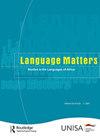Factors Contributing to Student Language Outcomes in a Biliteracy Setting According to Teachers’ and Parents’ Views
IF 0.8
3区 文学
0 LANGUAGE & LINGUISTICS
引用次数: 0
Abstract
Abstract The goal of the study reported on in this article was to determine whether the current biliteracy programme in Ghana (National Literacy Acceleration Program or NALAP) and the medium of instruction are considered as factors contributing to language and literacy learning of public school students according to teachers and parents. The target group (n = 126) consisted of 63 teachers and 63 parents in the Ashanti region of Ghana. The results drawn from self-administered questionnaires indicated that most of the respondents were positive that the biliteracy programme enhances students’ literacy skills. Most teachers reported that they prefer the use of both the Ghanaian L1 and English as media of classroom interaction and instruction, whereas most parents preferred English to be used as the medium of interaction. The study contributes to understanding the factors which support biliteracy learning based on teachers’ and parents’ views. The study made a methodological contribution in the development of a set of questionnaires.从教师和家长的观点看双语环境中影响学生语言成绩的因素
摘要本文报道的研究目的是确定加纳目前的双语计划(国家扫盲加速计划或NALAP)和教学语言是否被视为有助于公立学校学生学习语言和识字的因素。目标群体(n=126)由加纳阿散蒂地区的63名教师和63名家长组成。自我管理问卷的结果表明,大多数受访者对双语计划提高学生的识字能力持积极态度。大多数教师报告说,他们更喜欢使用加纳母语和英语作为课堂互动和教学的媒介,而大多数家长更喜欢使用英语作为互动的媒介。这项研究有助于从教师和家长的角度理解支持双语学习的因素。这项研究为编制一套调查表作出了方法上的贡献。
本文章由计算机程序翻译,如有差异,请以英文原文为准。
求助全文
约1分钟内获得全文
求助全文
来源期刊

Language Matters
Multiple-
CiteScore
1.20
自引率
0.00%
发文量
19
期刊介绍:
The purpose of Language Matters is to provide a journal of international standing with a unique African flavour focusing on multilingualism in Africa. Although the journal contributes to the language debate on all African languages, sub-Saharan Africa and issues related to multilingualism in the southern African context are the journal’s specific domains. The journal seeks to promote the dissemination of ideas, points of view, teaching strategies and research on different aspects of African languages, providing a forum for discussion on the whole spectrum of language usage and debate in Africa. The journal endorses a multidisciplinary approach to the study of language and welcomes contributions not only from sociolinguists, psycholinguists and the like, but also from educationalists, language practitioners, computer analysts, engineers or scholars with a genuine interest in and contribution to the study of language. All contributions are critically reviewed by at least two referees. Although the general focus remains on multilingualism and related issues, one of the three issues of Language Matters published each year is a special thematic edition on Language Politics in Africa. These special issues embrace a wide spectrum of language matters of current relevance in Southern Africa.
 求助内容:
求助内容: 应助结果提醒方式:
应助结果提醒方式:


